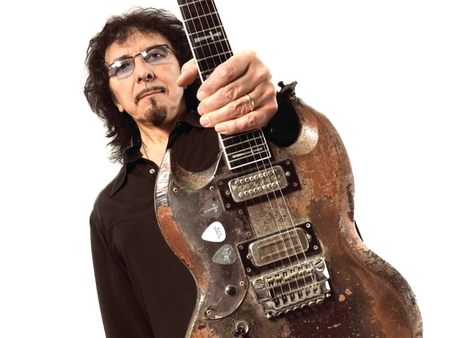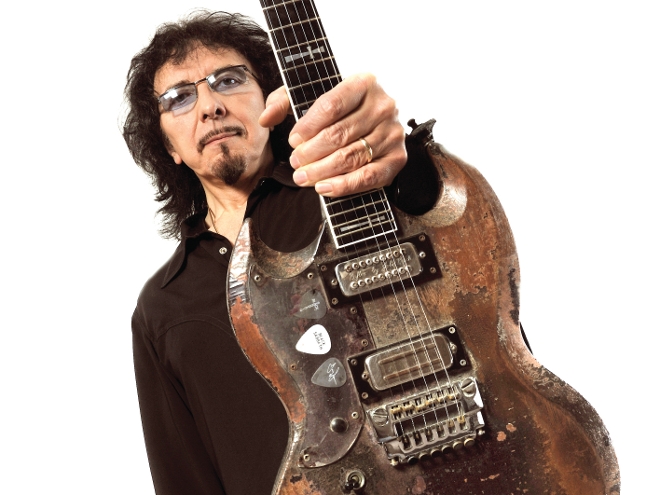Tony Iommi interview part one: Gear, tone and early 'Sabbath
Guitar gems from metal's godfather


Image: © Joby Sessions
When we interviewed Tony Iommi for TG210 (originally on sale 24 December - 20 January), the Brummie guitarist gave us so many great quotes that we couldn't fit them all into our cover feature. Luckily for you, we've put together some choice excerpts for a two-part Tony Iommi online interview. So here's the first part, with Iommi talking about key areas of his gear and tone over the years.
Interview: David West
The Mad Professor
Is it true you started using banjo strings on your guitar after your accident?
"Yes. I had big problems when asking string companies to make me sets of lighter gauge strings. They kept saying they couldn't do it, even though I'd made my own setup from banjo strings. I used banjo strings at first because I was trying to find anything that was light that I could use, and I dropped the gauge down so that I was using a fifth [string] as a sixth. That worked for me. Of course, it was also an art of trying to tune a guitar with lighter strings - old tuning pegs and the lighter gauge - created other problems."
What amps were you using in the early days of Sabbath, around the first album 'Black Sabbath'?
"I think I was using Marshall early on, and then Laney on the first album, but when we first wrote ['Black Sabbath'] songs I was using a Marshall 50-watt. I switched to Laney because they started up around the same time as us and they're a Birmingham company. To be honest, they offered to give us all this gear when nobody else did. What do you say to that? 'OK!' So I used them."
Want all the hottest music and gear news, reviews, deals, features and more, direct to your inbox? Sign up here.
Treble-trouble
What other key pieces of gear did you use back then?
"When I lived in Cumberland, when we did the Mythology thing [Iommi's earlier band], there was a guy up there and I used to use his treble booster called a [Dallas] Rangemaster to give my sound a bit more 'oomph'. A guy from another band up there said, 'I can make that sound better for you'. So he took it off me and brought it back the next day. I don't know what he did to it, but it was really good. I used that treble booster on all the early Sabbath albums and put it into the Laney because it boosted the input and gave it the overdrive I was looking for, which amps in the early days didn't have.
"I used that treble booster up until 1979 when I had a guy come in to build me some Marshalls. They gave me a whole stack of Marshalls and this guy came in and rebuilt them. In the meantime, while he was building these things, he threw my treble booster away. I didn't know until it came to the time when I was looking for it and he said, 'Oh that? I threw it away. It was crap'. I couldn't believe it. I've never seen it from that day on and my amps didn't sound right without it."
Your early Sabbath days were a challenge when finding the right gear for you. You faced some obstacles trying to get a 24-fret guitar designed…
"That's right. Everybody said, 'You can't do 24 frets'. I approached a couple of the big companies but they didn't want to know, so that's why I got involved with [British luthier] John Birch in the early days. I put money into his company so that we could build the 24 fret guitars. John was a bit of a mad professor, but we did it.
"I wasn't bothered about patenting the guitar or anything because I just wanted it for me. As long as it worked for me, that was it, and if anybody else wanted to have one that was fine, too. Also, investing in the guitar company enabled me to try out new ideas. Like, 'let's make some new pickups, rewire this or that'. I could experiment. They'd wind me a pickup, I'd go and try it at a gig, then bring it back the next day and say, 'No, it was crap'. They'd wind another one and I'd try it at the next gig. It was a bit dodgy because I only had one guitar, but that's what we did back then."
Tones for Tone
We're big fans of your 24-fret Gibson Custom Shop Iommi SG!
"The Custom SG Gibson made for me was based on the guitar I worked on with John Birch and John Diggins. The Custom has 24 frets and we worked on the pickup at Gibson, trying out some winding pickups. They're quite powerful pickups, and funnily enough Gibson were saying that a lot of jazz players are buying the pickups we designed. Apparently, they're really popular in the jazz field."
What do you think of the scooped tone?
"Certainly for chords. For me, that thin sound doesn't really work. It works great for a lot of the widdly-diddly players, but it doesn't seem to work for me. I have to have more of a fatter sound. I just hear it in my head. I can play faster stuff and cleaner stuff with that thinner sound. It's like with a wah-wah when you put it on halfway, you get that sound where you feel like you can play anything. The sound I tend to use, I think of how the band has got to sound and I try to make it fuller."
Are you happy with the tone you have now?
"I'm never, never satisfied. I'll do a tour and think, 'I want a bit more of this and a bit more of that'. I just have that thing where I have to try something else. At the moment I'm having a new pedalboard built. Sometimes I experiment on the road, which is difficult. Last year I ended up using Engl amplifiers and Laney, which were two different sounds altogether. That was last year's experiment. I'm looking forward to the next one!"
Total Guitar issue 210 (originally on sale 24 December - 20 January) featured Tony Iommi on the cover and contained 11-pages of Iommi coverage, including an in-depth interview and a complete tab of 'Planet Caravan'.
Matt is a freelance journalist who has spent the last decade interviewing musicians for the likes of Total Guitar, Guitarist, Guitar World, MusicRadar, NME.com, DJ Mag and Electronic Sound. In 2020, he launched CreativeMoney.co.uk, which aims to share the ideas that make creative lifestyles more sustainable. He plays guitar, but should not be allowed near your delay pedals.
